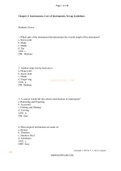Differentiating surgical - Study guides, Class notes & Summaries
Looking for the best study guides, study notes and summaries about Differentiating surgical? On this page you'll find 682 study documents about Differentiating surgical.
Page 4 out of 682 results
Sort by
Differentiating Surgical Instruments 3rd Edition Rutherford Test Bank
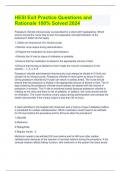
-
HESI Exit Practice Questions and Rationale 100% Solved 2024
- Exam (elaborations) • 63 pages • 2024
-
- $13.99
- + learn more
Potassium chloride intravenously is prescribed for a client with hypokalemia. Which actions should the nurse take to plan for preparation and administration of the potassium? Select all that apply. 1. Obtain an intravenous (IV) infusion pump. 2.Monitor urine output during administration. 3.Prepare the medication for bolus administration. 4.Monitor the IV site for signs of infiltration or phlebitis. 5.Ensure that the medication is diluted in the appropriate volume of fluid. 6.Ensure th...
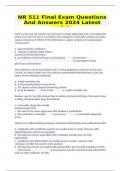
-
NR 511 Final Exam Questions And Answers 2024 Latest update
- Exam (elaborations) • 44 pages • 2024
-
- $18.49
- + learn more
NR 511 Final Exam Questions And Answers 2024 Latest update Janet is a 30 year old woman who has been recently diagnosed with a herniated disc at the level of L5-S1. She is currently in the emergency roomwith suspician of cauda equna compression. Which of the following is a signor symptom of cauda equina compression? a. gastrocnemius weakness b. reduced or absent ankle reflesc. numbness of the lateral foot d. paresthesia of the perineum and buttocks Correct Ans - d. paresthesia of the p...
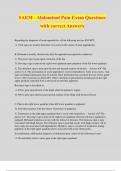
-
SAEM - Abdominal Pain Exam Questions with correct Answers
- Exam (elaborations) • 10 pages • 2024
- Available in package deal
-
- $11.49
- + learn more
SAEM - Abdominal Pain Exam Questions with correct Answers Regarding the diagnosis of acute appendicitis, all the following are true EXCEPT: A. Vital signs are usually abnormal, even early in the course of acute appendicitis. B. Rebound is usually elicited only after the appendix has ruptured or infarcted. C. The psoas sign is pain upon extension of the hip. D. Rovsing's sign is pain in the right lower quadrant upon palpation of the left lower quadrant. E. The obturator sign is pain upon ...
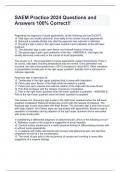
-
SAEM Practice 2024 Questions and Answers 100% Correct!!
- Exam (elaborations) • 167 pages • 2024
-
Available in package deal
-
- $13.49
- + learn more
Regarding the diagnosis of acute appendicitis, all the following are true EXCEPT: A. Vital signs are usually abnormal, even early in the course of acute appendicitis. B. Rebound is usually elicited only after the appendix has ruptured or infarcted. C. Rovsing's sign is pain in the right lower quadrant upon palpation of the left lower quadrant. D. The obturator sign is pain upon flexion and internal rotation of the hip. E. The psoas sign is pain upon extension of the hip. - ANSWER-A. V...
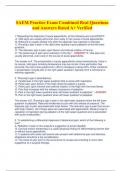
-
SAEM Practice Exam Combined Real Questions and Answers Rated A+ Verified
- Exam (elaborations) • 332 pages • 2023
-
- $27.99
- + learn more
SAEM Practice Exam Combined Real Questions and Answers Rated A+ Verified 1."Regarding the diagnosis of acute appendicitis, all the following are true EXCEPT: A. Vital signs are usually abnormal, even early in the course of acute appendicitis. B. Rebound is usually elicited only after the appendix has ruptured or infarcted. C. Rovsing's sign is pain in the right lower quadrant upon palpation of the left lower quadrant. D. The obturator sign is pain upon flexion and internal rotation of...
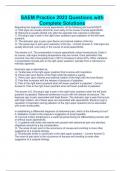
-
SAEM Practice 2023 Questions with Complete Solutions
- Exam (elaborations) • 169 pages • 2023
-
- $9.49
- + learn more
Regarding the diagnosis of acute appendicitis, all the following are true EXCEPT: A. Vital signs are usually abnormal, even early in the course of acute appendicitis. B. Rebound is usually elicited only after the appendix has ruptured or infarcted. C. Rovsing's sign is pain in the right lower quadrant upon palpation of the left lower quadrant. D. The obturator sign is pain upon flexion and internal rotation of the hip. E. The psoas sign is pain upon extension of the hip. - Correct Ans...
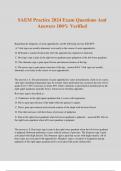
-
SAEM Practice 2024 Exam Questions And Answers 100% Verified
- Exam (elaborations) • 204 pages • 2024
- Available in package deal
-
- $15.49
- + learn more
SAEM Practice 2024 Exam Questions And Answers 100% Verified Regarding the diagnosis of acute appendicitis, all the following are true EXCEPT: A. Vital signs are usually abnormal, even early in the course of acute appendicitis. B. Rebound is usually elicited only after the appendix has ruptured or infarcted. C. Rovsing's sign is pain in the right lower quadrant upon palpation of the left lower quadrant. D. The obturator sign is pain upon flexion and internal rotation of the hip. E. The ps...
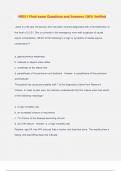
-
NR511 Final exam Questions and Answers 100% Verified
- Exam (elaborations) • 33 pages • 2024
- Available in package deal
-
- $13.49
- + learn more
NR511 Final exam Questions and Answers 100% Verified Janet is a 30 year old woman who has been recently diagnosed with a herniated disc at the level of L5-S1. She is currently in the emergency room with suspician of cauda equna compression. Which of the following is a sign or symptom of cauda equina compression? a. gastrocnemius weakness b. reduced or absent ankle refles c. numbness of the lateral foot d. paresthesia of the perineum and buttocks - Answer- d. paresthesia of the perineum ...
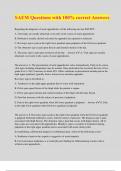
-
SAEM Questions with 100% correct Answers
- Exam (elaborations) • 114 pages • 2024
- Available in package deal
-
- $15.49
- + learn more
SAEM Questions with 100% correct Answers Regarding the diagnosis of acute appendicitis, all the following are true EXCEPT: A. Vital signs are usually abnormal, even early in the course of acute appendicitis. B. Rebound is usually elicited only after the appendix has ruptured or infarcted. C. Rovsing's sign is pain in the right lower quadrant upon palpation of the left lower quadrant. D. The obturator sign is pain upon flexion and internal rotation of the hip. E. The psoas sign is pain upo...

How did he do that? By selling his study resources on Stuvia. Try it yourself! Discover all about earning on Stuvia

